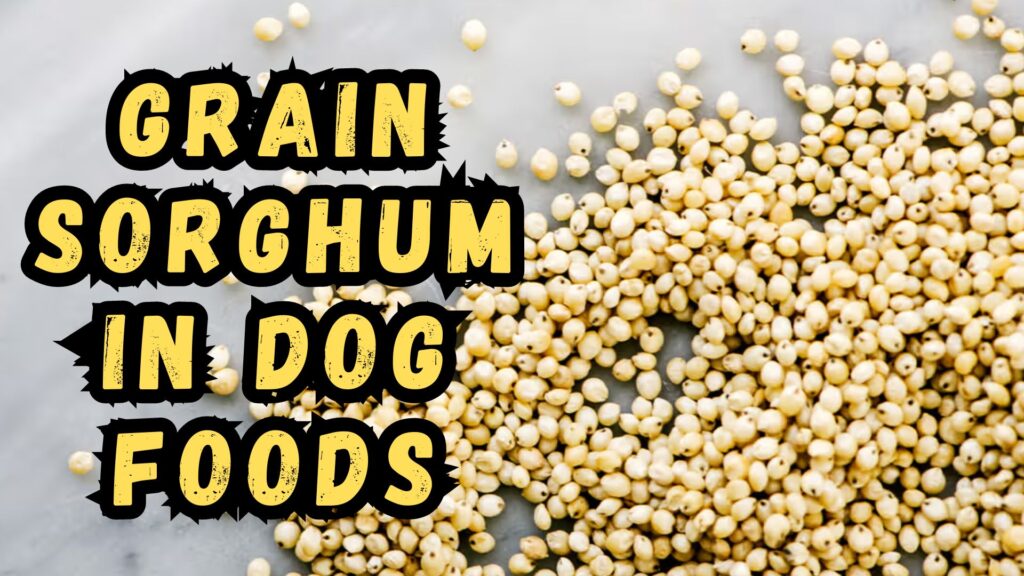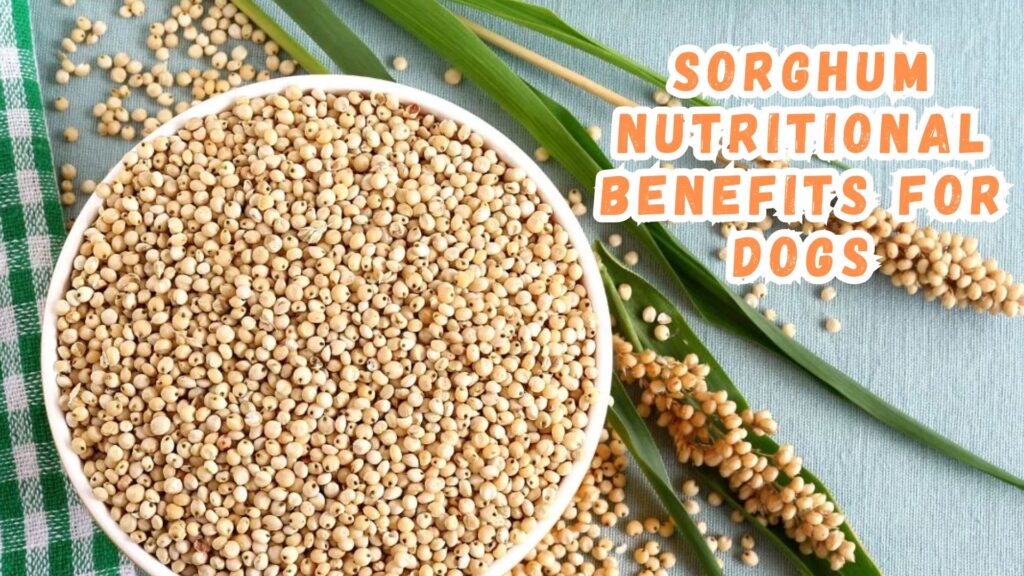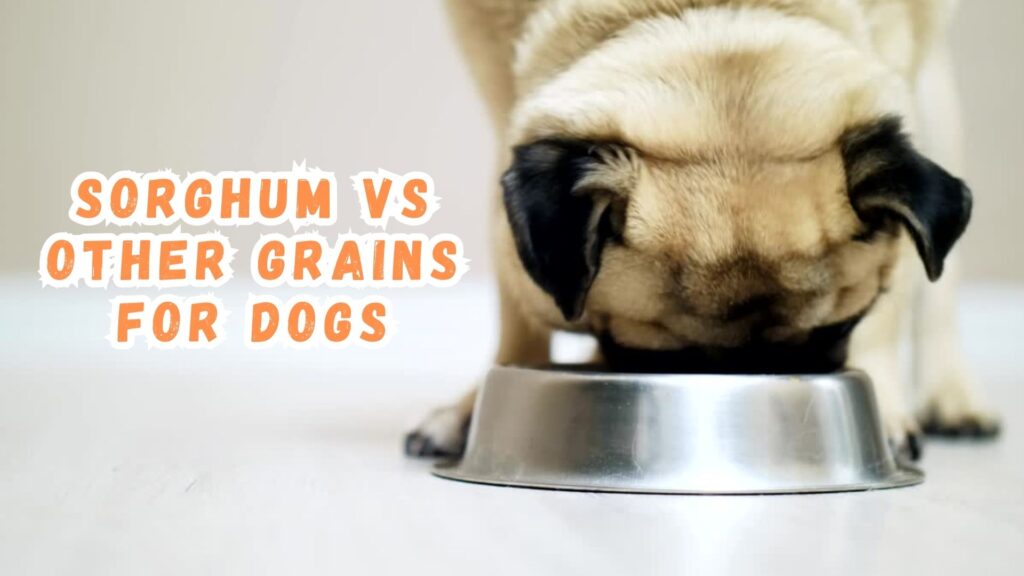Have you noticed grain sorghum listed on your dog’s food label and wondered what it is? As more pet owners seek healthier and more natural ingredients for their furry friends, grain sorghum has become an increasingly popular choice.
Grain sorghum, also known as milo, is an ancient grain that has been cultivated for thousands of years. Originally from Africa, it is now grown globally due to its resilience in dry climates and its nutritional value. This versatile grain is utilized in various products, including animal feed.
This article aims to provide a comprehensive overview of grain sorghum in dog food, highlighting its benefits, potential drawbacks, and overall impact on canine health.

Understanding Grain Sorghum: What is Grain Sorghum?
Grain sorghum is a cereal grain that belongs to the grass family. It has been a staple food in many cultures and is known for its drought resistance, making it a reliable crop in arid regions. In recent years, its use in pet food has grown due to its nutritional benefits.
Grain sorghum is packed with essential nutrients that contribute to a balanced diet. It is a good source of protein, providing the necessary amino acids for muscle development and maintenance.
Additionally, it contains important vitamins and minerals, including B vitamins, magnesium, and iron, which support overall health and well-being.
Why is Grain Sorghum Used in Dog Food?
Inclusion in Dog Food Formulations:
Dog food manufacturers choose grain sorghum for several reasons. Firstly, it is a highly digestible grain that provides sustained energy without causing spikes in blood sugar levels. This makes it an excellent choice for maintaining steady energy levels throughout the day.
Secondly, grain sorghum is less likely to cause food allergies compared to more common grains like corn and wheat, making it suitable for dogs with sensitivities.
Comparison with Other Common Grains:
Compared to corn and wheat, grain sorghum offers a lower glycemic index, meaning it releases glucose more slowly into the bloodstream. This can help prevent obesity and related health issues.
Additionally, it contains higher levels of antioxidants, which support immune health and protect against cellular damage.
Nutritional Benefits of Grain Sorghum

Health Benefits for Dogs:
Digestion:
Grain sorghum is rich in dietary fiber, which aids in digestion and helps maintain a healthy gut. It promotes regular bowel movements and can prevent constipation. Its fiber content also feeds beneficial gut bacteria, supporting overall digestive health.
Energy Levels:
The slow-release carbohydrates in grain sorghum provide dogs with a steady source of energy, making it ideal for active and working dogs. This sustained energy can help maintain stamina and prevent energy crashes.
Weight Management:
Due to its low glycemic index, grain sorghum can help manage a dog’s weight by reducing the risk of excessive fat storage. It helps in controlling appetite and can be beneficial for dogs prone to weight gain.
Allergen-Friendly:
Many dogs are allergic to common grains like corn and wheat. Grain sorghum offers an alternative that is less likely to trigger allergic reactions. It is a gluten-free grain, making it suitable for dogs with gluten sensitivities.
By understanding the nutritional profile and benefits of grain sorghum, pet owners can make more informed decisions about their dog’s diet.
This grain not only provides essential nutrients but also supports overall health, making it a valuable ingredient in dog food.
Grain Sorghum vs. Other Grains: Comparison Table

To understand how grain sorghum stacks up against other common grains in dog food, let’s take a look at a nutritional comparison.
The table below highlights the key nutrients found in grain sorghum, corn, wheat, and rice:
| Nutrient | Grain Sorghum | Corn | Wheat | Rice |
|---|---|---|---|---|
| Protein | 11.3g | 9.4g | 13.2g | 7.1g |
| Fiber | 6.7g | 7.3g | 12.2g | 3.5g |
| Magnesium | 165mg | 127mg | 136mg | 116mg |
| Iron | 4.4mg | 2.7mg | 3.8mg | 1.2mg |
| Glycemic Index | Low | Medium | High | High |
Digestibility and Glycemic Index:
Grain sorghum is known for its digestibility, which makes it a good choice for dogs with sensitive stomachs. Its low glycemic index ensures that it releases glucose slowly into the bloodstream, avoiding spikes in blood sugar levels.
This is particularly beneficial for managing weight and preventing diabetes. Compared to corn and wheat, which have higher glycemic indices, grain sorghum provides a more balanced energy source.
Rice, while also easily digestible, has a higher glycemic index, which can lead to rapid energy release and potential weight gain.
Potential Drawbacks: Possible Concerns
While grain sorghum has many benefits, there are some potential concerns to consider. One issue is the cost. Grain sorghum can be more expensive than other grains due to its growing conditions and processing requirements.
Additionally, its availability may be limited in some regions, making it less accessible for certain pet food manufacturers.
Another consideration is that, despite being less allergenic than other grains, some dogs might still be sensitive to it. It’s always important to monitor your dog’s reaction when introducing a new ingredient to their diet.
Veterinary Opinions:
Veterinarians generally view grain sorghum as a healthy ingredient in dog food.
“Grain sorghum provides a balanced source of nutrients and is particularly beneficial for dogs with specific dietary needs.”
Dr. Xeeshan, a veterinary nutritionist
However, she also advises pet owners to
“Consult with their vet before making any significant changes to their dog’s diet, especially if the dog has known allergies or sensitivities.”
Choosing the Right Dog Food: How to Read Dog Food Labels
When selecting a dog food that includes grain sorghum, it’s crucial to know how to read the ingredient list. Grain sorghum may be listed as “sorghum” or “milo” on the label.
Look for dog foods where grain sorghum is listed among the first few ingredients, indicating a significant presence in the formula.
Additionally, consider the overall nutritional profile and ensure it meets your dog’s specific needs.
Key Factors to Consider:
- Nutritional Balance: Ensure the dog food provides a well-rounded diet with the right balance of protein, fats, and carbohydrates.
- Allergens: If your dog has allergies, check for any other potential allergens in the ingredient list.
- Quality of Ingredients: Opt for high-quality, natural ingredients and avoid foods with artificial additives and fillers.
Top Dog Food Brands Using Grain Sorghum:
Several reputable brands incorporate grain sorghum into their dog food products. Here are a few to consider:
- Blue Buffalo: Known for its high-quality, natural ingredients, Blue Buffalo offers several formulas that include grain sorghum.
- Nutro: This brand emphasizes real, recognizable ingredients and includes grain sorghum in some of its recipes.
- Hill’s Science Diet: A trusted name in pet nutrition, Hill’s Science Diet uses grain sorghum in its sensitive stomach and weight management formulas.
Conclusion
Grain sorghum is a nutritious, digestible, and allergen-friendly grain that can be a valuable component of your dog’s diet. Its low glycemic index makes it an excellent choice for sustained energy and weight management. While there are some considerations, such as cost and availability, its benefits often outweigh the potential drawbacks.
Choosing the right dog food is essential for your pet’s health and well-being. By understanding the role of grain sorghum and other ingredients, you can make informed decisions that support your dog’s unique dietary needs. Always consult with your veterinarian to ensure the best choices for your furry friend.
FAQs
Is grain sorghum safe for all dogs?
Grain sorghum is generally considered safe for most dogs and offers several nutritional benefits. However, there are a few exceptions and special cases to consider. For instance, dogs with specific medical conditions, such as those requiring low-carbohydrate diets, might not benefit as much from grain sorghum.
Additionally, puppies with particular dietary needs might require a different nutritional balance. It’s always best to consult with your veterinarian before introducing any new ingredient into your dog’s diet to ensure it aligns with their health requirements.
Can grain sorghum cause allergies in dogs?
While grain sorghum is less likely to cause allergic reactions compared to more common grains like wheat and corn, it is not entirely free from potential allergenicity. Some dogs might have sensitivities to grain sorghum, though these cases are relatively rare.
Common signs of food allergies in dogs include itching, skin rashes, gastrointestinal upset, and ear infections. If you notice any of these symptoms after introducing grain sorghum, discontinue its use and consult your veterinarian for alternative dietary options.
How does grain sorghum compare to grain-free diets?
Grain sorghum provides a balanced source of nutrients and energy, making it a viable option for many dogs. In contrast, grain-free diets typically substitute grains with ingredients like potatoes or legumes.
Here are some pros and cons of grain sorghum compared to grain-free diets:
| Pros | Cons |
|---|---|
| Balanced Nutrition | Not Suitable for All Dogs |
| Offers a good mix of protein, fiber, and essential nutrients. | Dogs with specific dietary needs or medical conditions might benefit more from grain-free diets. |
| Lower Glycemic Index | Availability |
| Provides steady energy without causing spikes in blood sugar levels. | Grain sorghum might be less readily available in some regions compared to grain-free options. |
| Less Allergenic | |
| Less likely to cause allergies compared to common grains. |
Grain-free diets can be beneficial for dogs with grain allergies, but they may lack certain nutrients that grains provide. It’s important to choose a diet that suits your dog’s specific health needs.
What are the signs that my dog might benefit from a diet including grain sorghum?
Observing your dog’s health and behavior can help determine if grain sorghum would be a beneficial addition to their diet. Here are some signs to look for:
- Improved Digestion: If your dog has frequent digestive issues, such as diarrhea or constipation, grain sorghum’s high fiber content can promote better digestive health.
- Stable Energy Levels: Dogs that experience energy spikes and crashes might benefit from the slow-release carbohydrates in grain sorghum.
- Weight Management: If your dog is prone to weight gain, the low glycemic index of grain sorghum can help manage their weight more effectively.
- Reduced Allergies: If your dog shows signs of food allergies to other grains, switching to a diet with grain sorghum might alleviate these symptoms.
Always monitor your dog’s response to any dietary changes and consult your veterinarian if you notice any adverse reactions or if you need personalized dietary advice for your pet. This ensures that your dog’s nutritional needs are met while maintaining their overall health and well-being.


